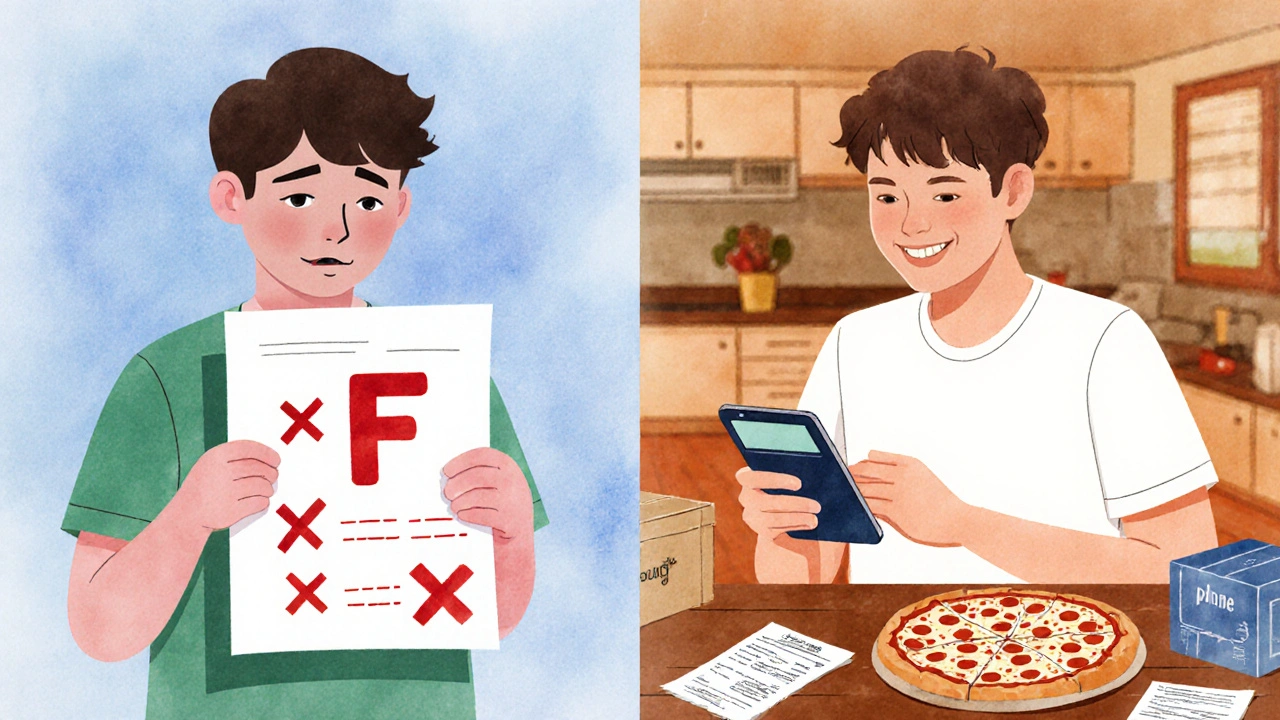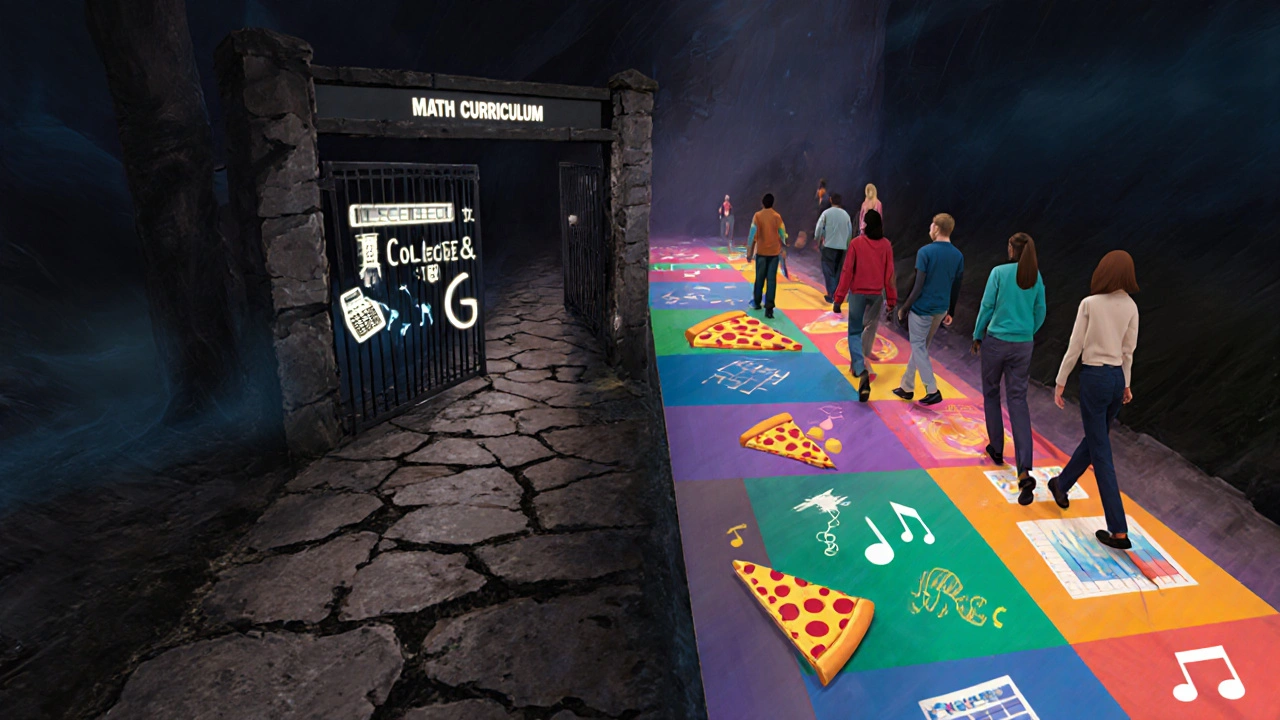What Is the Least Liked School Subject? Why Math Keeps Coming Last

Ask any group of high school students what subject they dread most, and more than half will say the same thing: math. It’s not just a few kids complaining. It’s a pattern repeated across classrooms in Asheville, Atlanta, and Anchorage. A 2023 National Assessment of Educational Progress survey found that 58% of 12th graders reported feeling anxious or overwhelmed when doing math homework. That’s not just stress-it’s a systemic disconnect.
Why Math Stands Out
Math isn’t the only subject students dislike. History can feel like memorizing dates no one cares about. Chemistry turns into a maze of equations and periodic tables. But math is different. It doesn’t just feel hard-it feels irrelevant. Students don’t see how factoring polynomials connects to their lives. They’re not asking, ‘Why do I need to know this?’ They’re asking, ‘Why am I being forced to suffer through this?’
Unlike writing an essay or analyzing a novel, math doesn’t give you room to breathe. There’s one right answer. No interpretation. No creative license. If you miss a step, the whole thing collapses. One wrong sign, one flipped fraction, and suddenly you’re staring at a red ‘F’ on a test you studied for hours. That kind of feedback is brutal. It doesn’t feel like learning-it feels like failure.
The ‘I’m Just Not a Math Person’ Myth
Teachers and parents often say, ‘Everyone struggles with math at some point.’ But that’s not helpful. What students hear is, ‘You’re not cut out for this.’ That label sticks. By eighth grade, many students have already decided they’re ‘not math people.’ And once that mindset takes root, it’s hard to shake.
Here’s the truth: math isn’t a talent you’re born with. It’s a skill built over time. But most classrooms don’t teach it that way. They rush through topics, move on before anyone fully understands, and then punish students for not keeping up. A 2022 study from Stanford’s Graduate School of Education showed that students who were given extra time and real-world examples to understand fractions improved their scores by 42%-but only 17% of U.S. public schools offered that kind of support.
How Math Is Taught vs. How It’s Needed
Think about the math you actually use in real life. Budgeting. Calculating tips. Understanding interest rates. Measuring ingredients. Reading graphs in the news. None of that requires solving quadratic equations. But that’s what’s on the standardized tests. Schools teach abstract concepts first, then pretend real-life application will follow. It rarely does.
Meanwhile, other subjects build relevance naturally. In English, you write about your opinions. In science, you do experiments. In art, you create something personal. Math? You’re handed a worksheet with 20 problems about trains leaving stations at different speeds. Who cares? No one’s ever asked you that outside a textbook.

It’s Not Just Math-But Math Is the Gateway
Math is the gatekeeper. If you fail algebra, you can’t take geometry. If you fail geometry, you can’t take pre-calc. If you can’t take pre-calc, you’re locked out of AP classes, STEM majors, even some college programs. That pressure turns every quiz into a high-stakes event. No other subject has that kind of domino effect.
And it’s not just about grades. It’s about identity. A student who struggles with math starts believing they’re not smart. They stop raising their hand. They avoid group projects. They drop out of science electives. One subject becomes the reason they think they’re not college material.
What Actually Helps
When schools change how they teach math, students respond. Take the math program at Asheville High. Instead of starting with equations, they began with problems students actually face: calculating monthly phone bills, comparing car loan options, figuring out how much paint they’d need to redo their bedroom. Suddenly, math wasn’t abstract. It was practical.
They also stopped grading every single problem. Instead, they focused on progress. Students got feedback like, ‘You got the setup right-now let’s fix the sign error,’ not just ‘-5.’ That small shift made a huge difference. By the end of the year, the number of students passing algebra increased by 31%.
Another winning move? Letting students use calculators early. Not as a crutch, but as a tool. The goal isn’t to do long division by hand-it’s to understand how numbers behave. Once students stop wasting energy on manual calculations, they can focus on logic and problem-solving.

What Doesn’t Work
More worksheets. More drills. More ‘just practice more.’ That’s like telling someone who hates running to run more. It doesn’t fix the problem-it makes it worse.
And telling students ‘you’ll need this in college’ doesn’t help either. Most won’t go to college. And even those who do might major in art, psychology, or communications. They’ll never use trigonometry again. But they’ll still be told they failed because they couldn’t solve a system of equations.
It’s Not About the Subject-It’s About the System
The least liked subject isn’t math because it’s inherently boring. It’s because the system around it is broken. We treat math like a gatekeeping exam instead of a tool. We punish mistakes instead of guiding growth. We ignore context instead of building connection.
Students aren’t rejecting math. They’re rejecting the way it’s been sold to them.
Imagine if we taught math like we teach cooking: start with something you love-pizza, tacos, cookies-then show how math helps you get it right. Measure ingredients. Adjust ratios. Time the bake. Calculate cost per serving. Suddenly, math isn’t a chore. It’s the secret to making your favorite thing better.
That’s the shift that needs to happen. Not more homework. Not tougher tests. Not more pressure. But more relevance. More patience. More humanity.
Until then, math will stay at the bottom of the list-not because it’s too hard, but because it’s been made to feel like a punishment.
Why is math the most hated subject in school?
Math is often the most hated subject because it’s taught as a series of abstract rules with no clear connection to real life. Students face high-stakes testing, rigid grading, and little room for error, which builds anxiety. Unlike subjects like art or English, where creativity and interpretation matter, math feels unforgiving. Add to that the pressure of it being a gateway to other courses, and it becomes a source of identity-based stress-not just academic struggle.
Is math really harder than other subjects?
Not necessarily. Many students find history or chemistry harder depending on their learning style. But math is unique because it’s cumulative. If you don’t understand fractions, you’ll struggle with algebra. If you don’t get algebra, geometry becomes impossible. Other subjects don’t build on each other the same way. That makes math feel like a wall you can’t climb if you fall behind early.
Do students hate math because they’re bad at it?
No. Students don’t hate math because they’re bad at it-they often become bad at it because they’ve been made to feel like they’re bad at it. The belief that you’re ‘not a math person’ is a learned mindset, not a fact. Research shows that with the right teaching approach-focused on understanding, not speed-most students can improve dramatically. The problem isn’t ability. It’s approach.
What other subjects are commonly disliked?
Chemistry and physics often rank high on dislike lists because of heavy math content and abstract concepts like atomic structure or Newton’s laws. Foreign languages can be frustrating due to memorization demands. Some students also dislike history when it’s taught as rote memorization of dates instead of stories and causes. But none of these carry the same emotional weight or long-term academic consequences as math.
Can math be made more enjoyable?
Yes-and it already has in some schools. Programs that tie math to real-world problems-like budgeting, sports stats, video game design, or even cooking-see big improvements in engagement. When students see math as a tool to solve things they care about, not just a test to pass, their attitude changes. The key is relevance, not rigor.
Should we stop requiring math in high school?
No-but we should rethink what math is required. Instead of forcing everyone through algebra II and trigonometry, schools could offer practical math tracks: financial literacy, data analysis, statistics for everyday life, or even coding with math applications. Not every student needs calculus. But every student needs to understand how to interpret a loan, read a graph, or calculate a discount. The goal should be functional math, not just academic math.
What Comes Next
If you’re a student who hates math, you’re not alone. And you’re not broken. The system is. But you still have power. Find one real-life use for math this week-whether it’s splitting a pizza bill, tracking your phone data usage, or figuring out how much you’ll save if you switch internet plans. That’s math. That’s power.
If you’re a teacher or parent, stop saying, ‘You’ll need this later.’ Start saying, ‘Here’s how this works right now.’ Show the connection. Be patient. Let them use tools. Celebrate progress, not perfection.
Math doesn’t have to be the subject everyone dreads. It just has to be taught differently.
Ian Maggs
November 22, 2025 AT 23:08Math, as currently taught, is a linguistic failure-a rigid, symbolic language stripped of narrative, context, and human intention. We don’t teach it as a tool for meaning; we teach it as a ritual of obedience. The symbols? Arbitrary. The rules? Culturally constructed. The anxiety? Systemic. We punish uncertainty in a discipline that thrives on it. The real crime isn’t failing algebra-it’s teaching algebra as if it were scripture, not a living, evolving framework for understanding patterns in the world.
Michael Gradwell
November 23, 2025 AT 01:04Flannery Smail
November 23, 2025 AT 18:14Emmanuel Sadi
November 24, 2025 AT 01:00Nicholas Carpenter
November 25, 2025 AT 20:55There’s so much truth here. I used to dread math until a teacher showed me how to calculate the exact amount of paint needed to redo my garage-then it clicked. Math isn’t the enemy. The way we’ve turned it into a gatekeeper is. Progress, not perfection. That’s the mantra schools need to adopt. Small wins build confidence. Confidence builds competence. And competence? That’s the real goal.
Chuck Doland
November 26, 2025 AT 14:37It is not merely a pedagogical failure; it is an epistemological misalignment. The curriculum presumes an abstract, deductive mastery as a prerequisite for cognitive legitimacy, yet fails to acknowledge the embodied, contextual, and iterative nature of mathematical cognition. The imposition of linear progression-fractions to algebra to calculus-as a universal trajectory ignores neurodiversity, cultural learning styles, and the pragmatic exigencies of modern life. The solution is not dilution, but diversification: a pluralistic mathematical literacy, wherein financial modeling, statistical reasoning, and algorithmic thinking are afforded equal curricular weight with symbolic manipulation.
Madeline VanHorn
November 28, 2025 AT 11:31Glenn Celaya
November 29, 2025 AT 00:00Wilda Mcgee
November 30, 2025 AT 16:12Okay, but imagine if we taught math like we taught music. You don’t start with sheet music and scales-you start with banging on pots, singing in the shower, dancing to your favorite song. Then you learn the theory behind why that beat makes you feel alive. Math is the same. Let kids play with numbers like they play with Legos. Let them break things, rebuild them, mess up, laugh, try again. That’s how mastery happens. Not through red X’s on a worksheet. Through curiosity. Through joy. Through seeing math as the secret code behind their favorite video game, song, or snack recipe.
Chris Atkins
December 1, 2025 AT 22:04Jen Becker
December 2, 2025 AT 12:22Ryan Toporowski
December 3, 2025 AT 01:57You got this 💪 Math isn’t about being perfect-it’s about showing up. Even if you only get one problem right today, that’s progress. I’ve seen students go from terrified to teaching others in a year. Just keep going. You’re not behind. You’re on your own path. And hey-if you need help, I’m here. No judgment. Just high fives 🤝😊